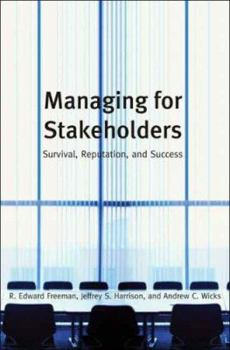Managing for Stakeholders: Survival, Reputation, and Success
Select Format
Select Condition 
Book Overview
"Managing for Stakeholders: Survival, Reputation, and Success," the culmination of twenty years of research, interviews, and observations in the workplace, makes a major new contribution to management... This description may be from another edition of this product.
Format:Hardcover
Language:English
ISBN:0300125283
ISBN13:9780300125283
Release Date:October 2007
Publisher:Yale University Press
Length:179 Pages
Weight:0.99 lbs.
Dimensions:0.7" x 6.4" x 9.5"
Customer Reviews
3 ratings
manging fo rstakeholders:
Published by Thriftbooks.com User , 15 years ago
A great introduction to a new way of seeing business. It is not only about making money, it is about giving a contribution to a better world. Managing for stakeholders is strong in its ideas and practical in how you make them happen. Make money for your owners and aim at doing somthing good for all the other stakeholders as well.
A practical approach to business management
Published by Thriftbooks.com User , 15 years ago
Good business leaders know they can help their firms succeed by connecting to their communities and by improving their relationships with employees, suppliers and customers. Yet, many executives still make the grave mistake of focusing solely on their shareholders and bankers, ignoring other important stakeholders. R. Edward Freeman, Jeffrey S. Harrison and Andrew C. Wicks provide new thinking and techniques to help you best manage stakeholder relationships and boost your firm's success. They offer practical advice for balancing the needs of your financiers with those of other stakeholders. getAbstract recommends this book to all managers and business thinkers. Board members and other professionals who want to understand their new roles and responsibilities in the globalized world of commerce will also value the authors' take on business ethics.
Our complex society requires corporate management to consider its context as well as its income
Published by Thriftbooks.com User , 16 years ago
I really have little use for the socialists who insist they have property rights to influence, control, and even run the daily operations of private (or even publicly traded) companies. This is not only a bad idea, it is bad for society. However, this book stops short of this "social responsibility" claptrap. The idea these authors present is that society is so complex that there is no such thing as a stand alone corporation. Companies require the infrastructure that society provides, they certainly need customers, and most have vendors. Those who pay the taxes, run the companies that supply other firms, and who live in the communities where these companies work, and who work in these companies, all have an interest in how these corporations influence their lives. If a firm bulls ahead without regard to the interest of these stakeholders, they will actually create more problems for themselves. The idea in the book is that a firm that works WITH its stakeholders actively rather than waiting until problems arise, is going to be more competitive, and contribute more net good to its shareholders and all who are affected by its work. When anyone claims the stakeholders are equal or greater than the shareholders, you lose me. I don't think these authors are claiming that. They are just claiming that prudence dictates that the corporation has more considerations than just the net income that can be provided to the shareholders. It makes some sense. Reviewed by Craig Matteson, Ann Arbor, MI






